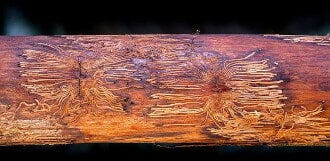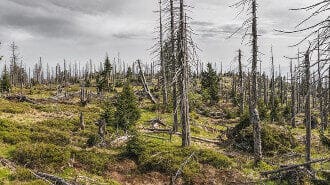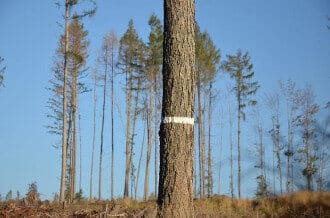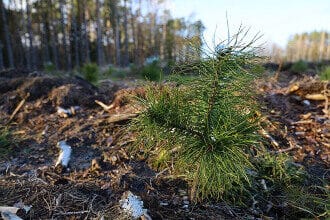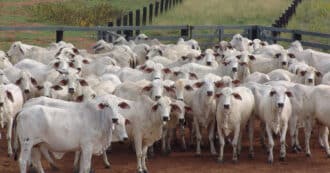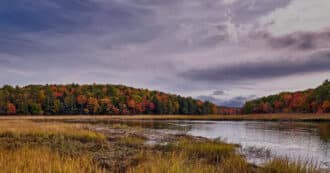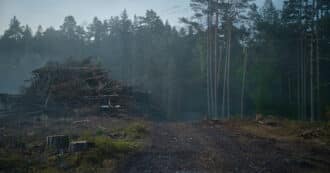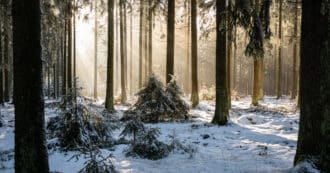By Harry Cooper – The pine beetle, or bark beetle, has been a part of the rocky mountain ecosystem for a long time. However as the Earth’s climate is warming, they have started to destroy the forests in which they live.
Pine Beetle Causes Trouble in the Rocky Mountains
The warming climate has given the mountain pine beetle a broader range and longer mating season. This has caused a mountain pine beetle infestation across the Rocky Mountains.
This pine beetle infestation has destroyed pine trees all across western North America. Efforts to conserve the forests have largely failed.
Rocky Mountain pine forests are largely incapable of defending themselves from the pine beetle. This has left many dead trees in the wake of these pine beetle infestations. While many believe that this could spell the end of the pine forests of North America, some think this could aid in the natural selection of more resistant trees.
What Are Pine Beetles?
The southern pine beetles are beetle natives to the Rocky Mountains of North America. The southern pine beetle reproduces by burrowing into pine trees and laying eggs.
The pine beetle then leaves the eggs to eventually hatch. However, the southern pine beetles often leave behind a deadly fungi that often kills off the tree.
This process normally fits within the dynamic of the Rocky Mountain ecosystem. By killing off a few trees, the pine beetle prevents the forest from overcrowding and makes space for healthy trees to grow.
However, changes in the Rocky Mountain climate has allowed for pine beetle populations to explode. This has caused an excessive amount of infested trees, beetle killed trees, killing off more trees than forest fires in the Rocky Mountains.
Climate Change in the Rocky Mountains
As it turns out, the mountain pine beetle outbreak can mainly be attributed to climate change. As the Rocky Mountains are getting warmer, several different conditions are put into place that allow the mountain pine beetles to spread across the region.
Increased Reproduction of The Pine Beetle
Bark beetles usually follow a fairly standard lifecycle. Once it gets warm in the spring, the bark beetles become active, reproduce in the summer, and are eventually killed off by the cold during the winter.
However, as the climate is warming, winter in the Rocky Mountains is getting shorter, and the spring and summer are getting longer. This is causing some pretty major shifts in the bark beetles life cycle.
With longer warm periods throughout the year, the beetles are able to reproduce more often than they normally would. And with shorter winters, less bark beetles die off from the cold.
This has allowed the pine beetle populations to grow exponentially. And with more beetles in the Rocky Mountains every year, more and more infested trees and high value trees are being killed off.
Mountain pine beetles expand their range
The pine beetle normally attacks high value trees that live at lower elevations such as the lodgepole pine. However, as temperatures continue to warm in the Rocky Mountains, the beetles are starting to expand their range.
As beetle populations are starting to climb into higher elevations, they are starting to attack new kinds of tree species, such as the Whitebark pine. These new species are less adapted to dealing with pine beetles, and have less natural defenses. Because the attacking beetles are starting to spread to less adapted trees, they are able to kill off the trees easier and faster.
Efforts to Fight The Pine Beetle
The forest service has tried many different methods to control pine beetle populations. Many have attempted to spray infected trees with carbaryl to kill off the beetles, or even removing infected trees from the forest altogether.
However, the beetles have expanded their range so extensively that stopping their spread is nearly impossible. But even with populations so out of control, some believe that the pine forests of the Rocky Mountains will live on.
Hope for the Future
While the pine beetles are killing off trees at unprecedented rates, many believe that the forests have a good chance of surviving. Since the beetles are able to kill off trees with less natural defenses faster, some scientists theorize that they are actually aiding in natural selection.
As the beetles kill off the weaker trees, only the stronger ones will be capable of surviving and reproducing. It is possible that the beetles could end up helping the pine trees of the Rocky Mountains adapt to create overall stronger forests in the long run. That is what the US forest service, woodland owners and the southern research station are all hoping for!
Pine Beetle and Religion
The Bible teaches us that when humanity exploits and abuses nature, nature fights back, as can be seen in the essay below. The example from this blog is that of humans burning fossil fuels, fossil fuels then warming the climate, warmer weather meaning less pine beetle eggs are killed in the winter resulting in a proliferation of the pine beetles that are killing the trees we rely on. Other examples of nature fighting back against humanity’s irresponsible stewardship can be found in the following essay from Eco Bible Volume 1.
Will Humans Rule, or Animals?
Genesis 1:28 – God Blessed Them and God Said to Them, “Be Fertile and Increase, Fill the Earth and Master It; and Rule the Fish of the Sea, the Birds of the Sky, and All the Living Things That Creep on Earth.”
On the surface, the words of this verse appear to give people license to degrade and subdue the earth, but the rabbis over the millennia for the most part do not read them this way. The rabbinic commentaries reveal much about these verses beyond the simple reading and make clear that a wholly different message is being conveyed.
Verse 26 states, God said, “Let Us make man in Our image, after Our likeness. They shall rule [Ve-Yir-Du] the fish of the sea, the birds of the sky, the cattle, the whole earth, and all the creeping things that creep on earth.” Verse 28 uses a command verb form, with God saying, “Rule [U-Re-Du] the fish of the sea, the birds of the sky, and all the living things that creep on earth.’”
The Midrash commentary here is based on a play on words in Hebrew, in which the root of the word “to rule” is the same root as the word “to be taken down.” Rabbi Chanina interpreted the Midrash to say: “If humankind is worthy, God says ‘U-Re-Du’ [you rule!]; while if humankind is not worthy, God says, ‘Yé-Ra-Du’ – he will be taken down (or let others [the animals] rule over him).”
Based on the Midrash, Rashi (Rabbi Shlomo ben Yitzchak) agrees that if we are not worthy, we will be ruled by animals. In this vein, H. Freedman and Maurice Simon comment, “Man is entitled to pre-eminence only as long as he cultivates his God-like qualities; when he voluntarily abandons them he is even lower than the brute creation.”
Can humans be ruled by animals today? At first, we may think human beings are so powerful, we are immune to these predictions. Yet, for example, insect infestations around the world have caused tremendous havoc in human life, from grasshoppers in Africa to bed bugs in North America. Insect-borne diseases such as malaria, dengue fever, West Nile virus, and Zika virus have spread to more northern latitudes, as human-induced climate change expands the range of certain mosquito species. The most recent case of tiny organisms antagonizing people is the coronavirus pandemic. Some research indicates that the virus likely spread from bats to pangolins (a spiny anteater) to people.
One key message from the Midrash is that God’s blessing to rule over other creatures depends on our living as righteous people. If humanity becomes worthy by living in a righteous way, then humans shall rule over nature. But if humans do not merit dominion, because they do not act in an upright fashion, then humanity will descend and not be granted rulership over nature. The rabbis learn this from the juxtaposition of God saying that humans will be created in God’s image immediately before saying that humans will rule over other creatures.
Rabbi David Sears writes that ruling “comprises a form of stewardship for which humanity is answerable to God. Both Talmudic and kabbalistic sources state that it is forbidden to kill any creature unnecessarily, or to engage in wanton destruction of the earth’s resources. All forms of life are precious by virtue of the Divine wisdom that brings them into existence, whatever rung they may occupy in the hierarchy of creation . . . The Divine mandate for man to dominate the natural world is a sacred trust, not a carte blanche for destructiveness.”
* Featured image source


